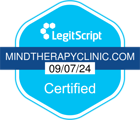Family Therapy at the Mind Therapy Clinic is a part of the integrated services designed around the needs of our clients, their loved ones and family members. Family therapy is a part of the overall treatment program provided by some of the best psychologists in the field who've dedicated their lives to helping people overcome mental health challenges.
When should you consider family therapy?
Family therapy can be useful in any family situation that causes stress, grief, anger or conflict. It can help you improve troubled relationships with your partner, children or other family members. You may address issues such as the impact of substance abuse or a mental illness on the entire family, conflict between parents and children, and marital or financial problems
Your family may pursue family therapy along with other types of mental health treatment at the clinic, especially if one of you has a mental illness or addiction that also requires additional therapy or rehabilitation treatment.
Family therapy can help family members cope if a member has a serious mental illness such as schizophrenia — but the person who has schizophrenia should continue with his or her individualized treatment plan, which may include medications, one-on-one therapy or other treatment.
In the case of addiction, the family can attend family therapy while the person who has an addiction participates in residential treatment. Sometimes the family may participate in family therapy even if the person with an addiction hasn't sought out his or her own treatment.
For those with PTSD, family therapy can help you share tough emotions with adults and children, and learn coping skills that will bring the family closer.
Family therapy can be combined with the integrated treatment programs at Mind Therapy Clinic. You or your loved one may participate in the following at any point in time for optimal benefit:
For optimal results, family therapy may be combined with:
Individual Therapy
Psychiatric Medication Management
Technology-assisted Psychiatric Treatments
Neuropsychological Evaluation
Group Therapy
Education and Coaching
Intensive Outpatient Program
Partial Hospitalization Program
Trauma Treatment Program
What Family Therapy is not
It is important to understand the misconceptions about family therapy before starting. Those include:
Family therapy takes a long time.
Medicating children or teens for problems is much quicker.
Therapists blame parents for children's problems.
The whole family will have to be present at every session.
Family therapy is ineffectual.
Family therapy helps family situations involving:
Addiction and co-occurring problems such as anxiety, depression, ADHD, hallucinations, and others
Extreme mood problems
Severe psychotic symptoms such as thoughts of harming self and others, hallucinations, delusions, and schizophrenia, and co-occurring disorders such as depression and OCD.
Substance abuse
Behavioral issues such as social anxiety, peer difficulties, impulsivity, and impaired academic performance
Difficulty moving forward into mature adulthood
Disordered eating including distorted body image
Family distress
Interpersonal and childhood trauma (read about Mind Therapy Clinic's Center for Trauma).
Relationship problems
Anger Management
Grief
Stress Management


